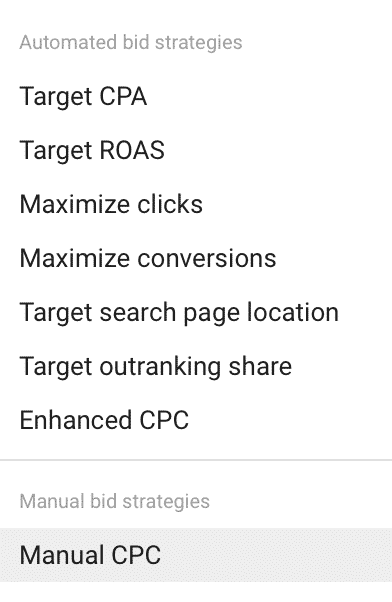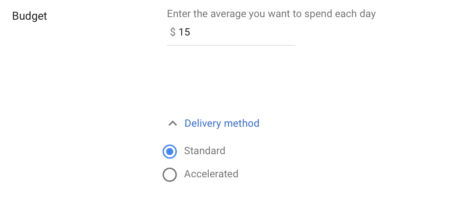Everything You Need to Know About AdWords Bid Management
by Ana Gotter • January 5, 2018
Google AdWords runs on an auction system. Advertisers bid on actions they want their campaigns to produce, like clicks on their ads.
After examining the ad group relevancy and bid competitiveness, Google hands out ad placements for different keywords—making bid management a critically important component of any good AdWords strategy.
While bidding isn’t the only factor that determines your ad placements, it is an important one.
No matter how great your quality score is, you’ll never get placements if your bids are too low. Of course, if your bids are too high, you can also end up wasting a ton of money, so you have to balance both extremes to produce profitable results.
Google AdWords bid management can be complex and a little confusing, but it’s important to understand what bid management is and how it works. In this post, you’ll earn everything you need to know about AdWords bid management so that you can get the best results possible from your AdWords campaigns.
AdWords Bid Management
When you create a campaign in Google AdWords, you’ll immediately notice that there are several different bid management options that you can use. These different options essentially allow you to optimize for different goals and customize how and what you want to bid.

Here are your options:
- Manual CPC, which lets you set the maximum cost-per-click amount that you’re willing to pay. You will never pay more than that bid on any ad.
The other options are all “smart” or “automated” bidding options that use Google algorithms to calculate your ideal cost-per-click based on your specific goals.
- Target CPA, where you specific how much you are willing to spend to produce a certain action
- Target ROAS, where you specify what sort of return on ad spend you want from your ads (generally works best for eCommerce companies)
- Maximize clicks, where Google will try to get you as many clicks as possible out of your budget
- Maximize conversions, which works like maximize clicks, except Google tries to maximize conversions, not clicks
- Target search page location, where Google optimizes your bids to get you a specific ad rank
- Target outranking share, which essentially allows you to pick how often you want to outrank the competition
- Enhanced CPC, which adjusts your bid up or down in order to optimize for conversions
Manual bidding allows you to say “this is as much as I’m going to pay, and that’s it. Manual CPC is the only manual bidding options.

Smart bidding, on the other hand, will take your bids and use them a little more creatively to reach very specific results. It gives you a little less control, but it tells Google what you’d like them to optimize for.
How Much Should I Bid on Google AdWords?
Bid management is actually a fairly complex process. When determining how much you should bid on a single Google AdWords campaign, you’ll want to consider:
- The average CPC of your chosen keyword(s). Different keywords will cost more than others due to volume and competition levels. If you really want to have placements for high competition keywords, you’ll need to bid more. Keyword research tools like SEMrush can show you the estimated CPC of individual keywords.
- Your budget. If you have a smaller budget and want to make it go further, consider bidding on lower cost keywords or making smaller bids.
-

If your budget is on the smaller side, you may get more bang for your buck by keeping CPC costs down.
- Your ROI. Google AdWords is typically used for customer acquisition, so while a few dollars for a single click or conversion can seem expensive, it is often worth the investment. If it costs $5 to get a conversion, but it immediately brings in $15 in pure revenue, that’s not a bad deal, especially when considering that the customer lifetime value (LTV) may be closer to $450.
You need to keep all of these factors in mind when deciding how much you want to bid on Google AdWords. And here’s the tricky part: you’ll want to do this for each individual campaign, because certain keywords advertising certain products or services may have different revenue or LTV marks.
Adjusting Your Bids
As you’re monitoring your campaigns, you may notice different scenarios that could indicate that it’s time to adjust your bid. You can adjust your bid at any time during the campaign’s lifespan.

Scenarios where you may want to adjust your bid include:
- If your CPC is coming in way under budget, but you want to improve your position in the ad display, increase it.
- If your CPA is too high, but you’re in a top position in the ad rankings and you want to stick with the keyword, drop your bid slightly. This can bring the CPA down while still getting you placements.
- If you’re getting a ton of conversions, but your profit margin is low, change up your bid.
- If you’re paying for a lot of clicks but not getting conversions, switch up your bid strategy or change your keywords.
Good bid management is an ongoing process. The market is constantly changing and if you aren’t changing your bids in response, you can quickly find that either your ads aren’t showing or you’re paying too much for your clicks.
4 AdWords Bidding Mistakes to Avoid
AdWords bid management can be complex, so it’s not much of a surprise that mistakes can be made. Unfortunately, these mistakes can cost you a heck of a lot of money that could have better spent being invested correctly.
Here are the four most common AdWords bid management mistakes to avoid:
- Not monitoring your campaigns. “Set it and forget it” is never a good idea for any PPC platform and AdWords is no different. Keep an eye on your campaigns to see how we’ll they’re performing and what they’re costing you. Adjust as needed.
- Not split testing. A/B testing makes it possible to determine which bid levels and keyword groups are most cost-effective for your business. Consistent split testing will consistently increase the ROI of your campaigns.
- Using one bid across all campaigns. Different keyword groups will cost more and that’s okay. Sometimes, it’s worth it to pay a significantly higher CPC if it helps you beat out your competition. Consider which keywords may be more important to your business. You may find, for example, that “laptop repair center Philadelphia” will bring you more lucrative clicks than “laptop repair shop reviews”. Some campaigns might bring you leads, while other bring you direct sales.
- Making bid adjustments too quickly. While Google AdWords can drive immediate results, sometimes that’s just not the case and making rash bid adjustments based on immediate information can hurt your campaigns. Sometimes it will take a few days for customers to come back around and convert, and if you don’t account for conversion delays, you’re operating on incomplete data.
By avoiding these common bid management mistakes, you should be well on your way to setting up a profitable bidding strategy.
Conclusion
Bid management on Google AdWords is a critical part of any campaign and the right bidding strategy can be the difference between wasting money and making it. Understanding when to bid higher or lower or when to adjust your bids will be crucial for ongoing profitability for your campaigns, allowing you to maximize results and minimize ad spend simultaneously.
By the way, if you’d like help choosing the right bids for your campaigns, let me know here or in the comments. I’d love to help!
What do you think? How do you approach Google AdWords bid management? How do you decide which keywords to bid more for? Leave us a comment and let us know what you think!




